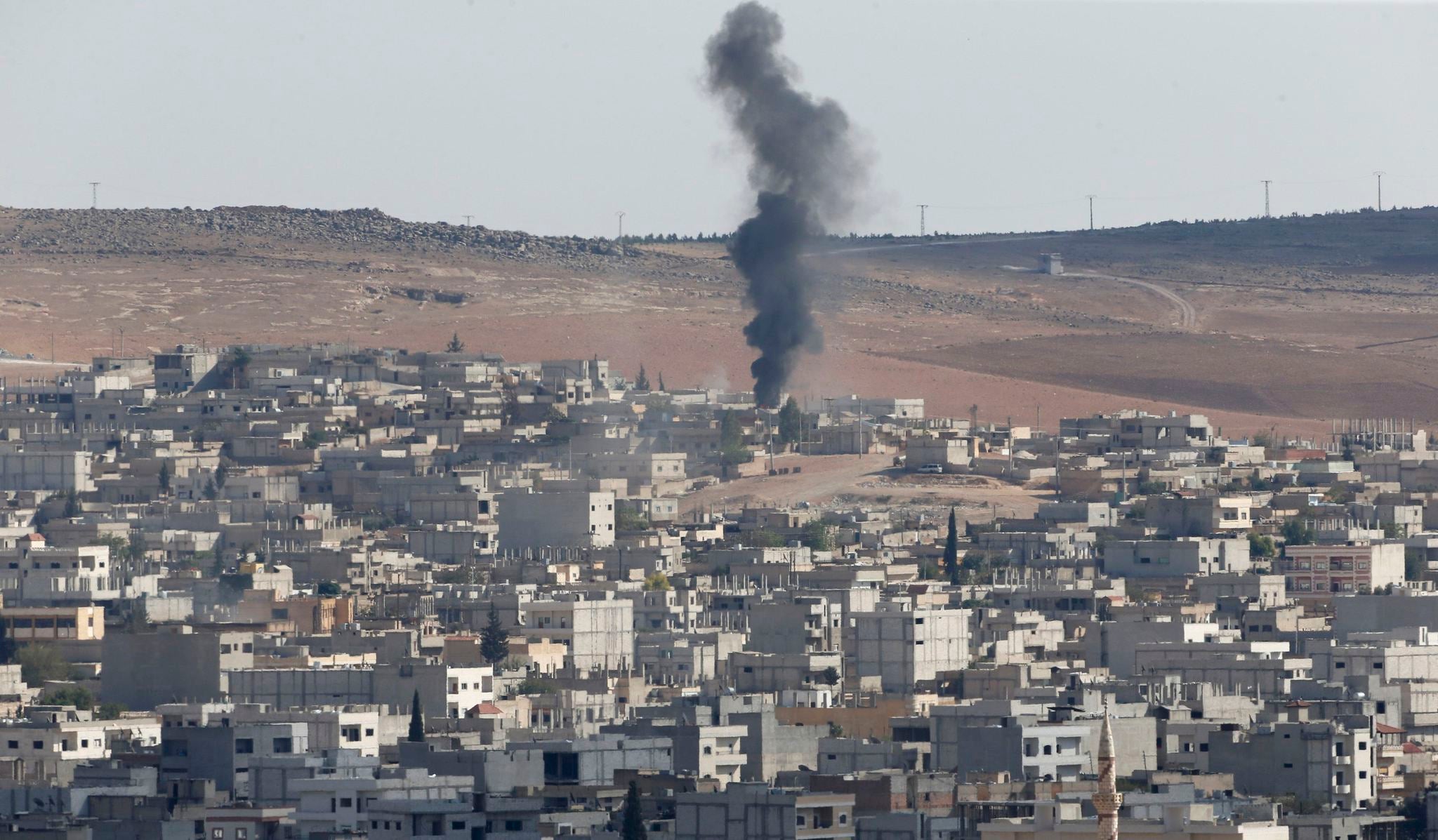Isis in Kobani: Turkey ignores Kurdish fury as militants close in on capturing the town
President Erdogan sees the jihadists as an opportunity to target Assad rather than a threat

If Kobani falls to the fighters of Isis there will be a surge of violence across Turkey. The 15 million Turkish Kurds will blame the Turkish government for enabling Isis to capture the Kurdish enclave by denying its defenders reinforcements, weapons and ammunition.
The faltering peace process between the Turkish Kurd militants and Ankara may finally collapse. A Kurdish politician was quoted as saying that “you can’t expect to break the backs of the Kurds in Syria and win their hearts in Turkey”.
All this week there have been protests and riots in every Turkish city where there are a significant number of Kurds. Twenty-two people have been killed in the fiercest street clashes that Turkey has seen for years.
Smoke rises from bonfires in the streets with the police generally relying on pepper spray and water cannon while angry Kurds hurl stones and Molotov cocktails.
The month-long siege of Kobani has become part of the Kurdish national legend like the killing of 5,000 Kurds with poison gas at Halabja by Saddam Hussein in 1988.
Six provinces in south-east Turkey have been placed under curfew. There are signs of an anti-Kurdish and pro-Islamist backlash with Turkish police shouting Isis slogans as they charge Kurdish demonstrators. Antagonisms have spread beyond Turkey into Europe with a pro-Isis crowd in Hamburg attacking Kurdish protesters with knives.
The Turkish general staff stirred nationalist passions by claiming that Kurds have burnt Turkish flags. President Recep Tayyip Erdogan said openly that Isis and the Kurdistan Workers’ Party (PKK), the Kurdish movement that has fought for Kurdish self-rule since 1984, are much the same. He said: “It is wrong to deal with them differently, we need to deal with them jointly.”
The Turkish authorities have been as good as his word. The US is launching air strikes to save the Syrian Kurdish militants holding Kobani from Isis attack, but when five of these crossed the border into Turkey they were seized by the Turkish army which described them as “separatist terrorists”.
This is a return to demonisation of the PKK and all Kurdish dissidents at the height of the Kurdish insurgency in Turkey in 1990s. The PYD, the political representative of the Syrian Kurds and a branch of the PKK, was denounced in a tweet by a senior member of the ruling AKP party, Emrullah Isler, saying it is worse than Isis because, while the latter killed, they did not torture.

The Turkish government has so far been outwardly uncaring over the turmoil in the streets unleashed by its role in allowing Isis to come close to capturing Kobani. It may be that Mr Erdogan has had sufficient success in muzzling the Turkish media that the authorities themselves may underestimate the gravity of what is going on and its potential for getting a great deal worse.
As the death toll climbed on 7 October, prominence was given in news bulletins to the award of a medal by Croatia to a Turkish businessman. CNN Turk, which had attracted much derisive criticism for showing a documentary about penguins during the Gezi Park protests, which convulsed Turkey in 2013, this time showed a film about honeybees as violent rioting convulsed the country.
Mr Erdogan’s unconcern about Kurdish fury is curious since progress in de-escalating Turkish-Kurd violence has been one of the achievements of his AKP party’s years in office. Mr Erdogan had looked to Kurdish support to increase the powers of his office. Writing in al-Monitor Amberin Zaman says that the reason why the authorities are so unconcerned is because “Erdogan and his AKP disciples view Kobani as an opportunity rather than a threat”. This opportunity is not to win popularity among the Kurds by rescuing Kobani, but to exploit a moment of maximum Kurdish weakness when they are under threat from Isis.

When Salih Muslim, a leader of the PYD, met Turkish officials in Ankara last week he reportedly asked for Turkey to allow anti-tank weapons to be delivered to Kobani to stop the tanks captured by Isis from the Iraqi and Syrian armies. The Turks said they would only allow this if the PYD denounced President Bashar al-Assad, joined the anti-Assad rebels, dissolved their local administrations running the Syrian Kurdish cantons and gave power to other Kurdish parties.
A Syrian Kurdish observer said that “they were also asked to break their connection with the PKK which is impossible because they are a branch of the PKK. The Turks must have known they would be turned down.” Turkey’s priority is evidently to abolish the Syrian Kurd statelet as a bad example of self-determination which might strengthen the Kurds in Turkey.
In using the Isis threat to extract concessions from the Kurds and the Americans, Mr Erdogan may be overplaying his hand. He has made clear that his price for acting against Isis is a buffer zone inside Syria run by Turkey to be used as a sanctuary by refugees and anti-Assad rebels; a no-fly zone; and a commitment by the US to overthrow the government in Damascus.
All Mr Erdogan’s demands show that his target is Mr Assad as the source of all evil in Syria who ruthlessly kills his own people. He evidently sees no hypocrisy in accusing the Syrian government of such crimes while protesters are being shot down in cities across Turkey in numbers that may increase tragically if Kobani falls.
Join our commenting forum
Join thought-provoking conversations, follow other Independent readers and see their replies
Comments